Discover Tech Lead Journal
Tech Lead Journal

Tech Lead Journal
Author: Henry Suryawirawan
Subscribed: 340Played: 10,940Subscribe
Share
© Henry Suryawirawan
Description
Great technical leadership requires more than just great coding skills. It requires a variety of other skills that are not well-defined, and they are not something that we can fully learn in any school or book. Hear from experienced technical leaders sharing their journey and philosophy for building great technical teams and achieving technical excellence. Find out what makes them great and how to apply those lessons to your work and team.
261 Episodes
Reverse
Think you’re just “not a people person”? Most tech leaders quietly believe this about themselves, and it’s exactly what’s holding them back.In this episode, Martijn Versteeg, founder of peer leadership community Group Effort and former CPTO with a background in organizational psychology, makes the case that it’s not: human behavior follows predictable patterns you can understand and work with, just like any system. The conversation covers a six-variable model for understanding what drives behavior and disengagement on your team, why popular personality tools like MBTI and DiSC often do more harm than good, and a clear structure for delivering bad news without the usual stress buildup. We also get into what it really takes to let go of hands-on coding when you move into leadership, why developing a product mindset matters even if product isn’t in your title, and the psychological risks of heavy AI use that most teams still aren’t thinking about.Key topics discussed:The 6 human needs that predict human behaviorWhy MBTI and DiSC often do more harm than goodHow to stop avoiding difficult conversationsDeliver bad news clearly using a 10-second ruleWhy becoming a bottleneck is a slow career killerBuilding a product mindset when you’re in techThe mental health risks of heavy AI useWhat peer groups give you that books can’tTimestamps:(00:00:00) Trailer & Intro(00:03:06) Why Small Steps Matter More Than Career Turning Points(00:05:11) About Martijn Versteeg(00:07:01) How Can I Learn People Skills Systematically?(00:13:19) Six Human Needs That Predict Behavior(00:17:28) How Does It Compare to Maslow’s Hierarchy of Needs?(00:19:49) Why Are Personality Tests Like MBTI Unreliable?(00:23:20) How Do I Use Pain and Pleasure to Drive Growth?(00:28:30) How Do I Handle Conflict and Difficult Conversations?(00:32:47) A Model for Delivering Bad News in 10 Seconds(00:36:12) How Do I Transition from Tech Lead to Engineering Leader?(00:41:12) How Do I Let Go of Coding as a Leader?(00:42:49) The Vanilla Orchid Story: Why Leaders Must Let Go(00:46:55) How Can Engineers Develop a Product Mindset?(00:53:17) What Are the Hidden Risks of AI for Mental Health?(01:02:19) What Is the Value of Learning Through Podcast Conversations?(01:07:19) Why Consuming Knowledge Is Not the Same as Producing(01:09:06) 3 Tech Lead Wisdom_____Martijn Versteeg’s BioMartijn Versteeg is the founder of Group Effort, a Netherlands-based collective that empowers tech and product leaders across Europe through peer groups, offsites, and specialized training. As a key figure in the global product community, he is also an organizer of the Product Mastery Conference, where he helps curate insights for the next generation of product leaders.Before founding Group Effort, Martijn built and successfully sold an EdTech IT platform and spent over five years as an Agile coach and Scrum Master. His unique perspective on leadership is rooted in high-performance athletics; at just 22 years old, he served as the National Rowing Coach for Singapore.Today, Martijn is a vocal advocate for community-led learning. He frequently challenges leaders to move past the search for “golden nuggets” of wisdom and instead focus on the consistent, incremental iterations that solve the “hard people stuff” in scaling organizations.Follow Martijn:LinkedIn – linkedin.com/in/versteegGroup Effort – groupeffort.nlNewsletter – groupeffort.nl/newsletterFree training on Massive Action-Taking for Product Leaders – groupeffort.nl/actionLike this episode?Show notes & transcript: techleadjournal.dev/episodes/248.Follow @techleadjournal on LinkedIn, Twitter, and Instagram.Buy me a coffee or become a patron.
Is your platform engineering initiative struggling to deliver results? The problem might not be your tools or technology at all.In this episode, Sam Barlien, Community Organizer at Platform Engineering (the world’s largest platform engineering community), shares insights from speaking with nearly 400 engineering leaders last year about why their platform initiatives succeed or fail. The biggest revelation: it’s almost never about the tools. Sam explains why treating your internal platform like a product, complete with user research, documentation, and a product manager mindset, is the key differentiator between real platform engineering and just a rebranded operations team. He breaks down how to start small with a minimum viable platform, measure what actually matters, and build golden paths that developers want to follow. The conversation also covers how AI is both accelerating the need for platform engineering and transforming how platforms are built and operated.Key Topics Discussed:What platform engineering really means (hint: it’s product management)Why DevOps and SRE often fail without product thinkingThe “Golden Path” vs “Golden Cage” approach to developer experienceHow to measure ROI and pitch platform engineering to executivesThe symbiotic relationship between AI and platform engineeringWhy starting with a Minimum Viable Platform beats big-bang transformationsPlatformCon 2025 key takeaways and emerging trendsTimestamps:(00:00:00) Trailer & Intro(00:03:16) What Background Do You Need for Platform Engineering?(00:06:32) How Does Storytelling Help in Platform Engineering?(00:08:53) What Is Platform Engineering?(00:12:27) Why Are Organizations Adopting Platform Engineering?(00:19:51) What’s the Difference Between DevOps, SRE, and Platform Engineering?(00:23:25) Why Is the “Plug and Play” Approach to Tools a Trap?(00:28:45) How Do You Pitch Platform as a Product Instead of a Project?(00:34:01) How Do You Measure the ROI of Platform Engineering?(00:40:42) What Is the Golden Path in Platform Engineering?(00:47:12) What Were the Key Takeaways from PlatformCon 2025?(00:53:41) How Does Platform Engineering Leverage AI?(00:58:41) What Are the Hidden Costs of AI-Generated Code?(01:04:01) Why Is Platform Engineering Actually Product Management?(01:07:12) 1 Tech Lead Wisdom_____Sam Barlien’s BioSam Barlien is a community organiser for the Platform Engineering Community. He is a tech nerd, and has been involved in tech communities for more than 10 years. He helps manage Platform Weekly, co-hosts PlatformCon, and drives the community Ambassador program, blog and Youtube channel.Follow Sam:LinkedIn – linkedin.com/in/sam-barlien-3b2579184Platform Engineering – platformengineering.orgPlatformCon – platformcon.comWeave Intelligence – weaveintelligence.ioLike this episode?Show notes & transcript: techleadjournal.dev/episodes/247.Follow @techleadjournal on LinkedIn, Twitter, and Instagram.Buy me a coffee or become a patron.
(05:13) Brought to you by Sweep AISweep is the fastest coding assistant for JetBrains. It lets you write code 10x faster. Finally, AI that works in JetBrains. Download for free at sweep.dev.What if Southeast Asia had its own ChatGPT that cost 20x less? Bruce Yang built Agnes AI to solve what global companies ignore: accessible AI for emerging markets.In this episode, Bruce Yang, CEO and founder of Agnes AI, explains how he’s built Southeast Asia’s fastest-growing AI platform with 4 million registered users and 300K daily active users. After working at Microsoft and LinkedIn in Silicon Valley, Bruce returned to Singapore and started his PhD at NUS right before COVID, positioning him perfectly to ride the AI wave. Agnes AI uses smaller, specialized models trained on Southeast Asian languages and local user data to deliver productivity features like deep research, PowerPoint generation, and AI-powered group chats at 1/20th the cost of major competitors. We discuss the challenges of building AI for emerging markets, the importance of keeping humans in the loop for critical thinking, and why Bruce believes the future of AI belongs to applications, not just models.Key topics discussed:Making AI 20x cheaper than ChatGPTWhy Southeast Asia needs its own AI modelsUsing multi-agent systems to reduce hallucinationsAI group chats and social featuresCritical thinking in an AI-assisted worldWhy Agnes avoids the AI coding spaceAI bubble debate: hype vs. real valueGetting emerging markets to adopt AISubscription vs. pay-per-use business modelsTimestamps:(00:00:00) Trailer & Intro(00:02:49) Why Did Bruce Start a PhD During COVID to Build an AI Company?(00:06:16) Why Build Another AI Model When Thousands Already Exist?(00:09:48) How Is Agnes AI Cheaper and Faster Than ChatGPT?(00:14:00) Does Agnes AI Support Southeast Asian Languages and Cultures?(00:15:34) How Does Agnes AI Handle Local Languages Better Than Global Models?(00:17:57) How Does Agnes AI Reduce Hallucinations?(00:20:03) What Can Agnes AI Do That ChatGPT Cannot?(00:25:31) Why Is AI in Group Chats the Next Big Thing?(00:29:18) How Does Agnes AI Keep Your Private Group Conversations Secure?(00:31:41) Will AI Make Us Lose Our Critical Thinking Skills?(00:37:43) Should Children Use AI for Schoolwork?(00:40:27) Can Agnes AI Help With Coding Like Cursor?(00:43:07) Will Everyone Host Their Own AI Model in the Future?(00:47:39) Is AI a Bubble or Real Economic Transformation?(00:51:01) How Can Southeast Asians Start Using AI Today?(00:53:56) What Are Real-World Examples of People Using Agnes AI?(00:57:30) How Does Agnes AI Make Money While Offering Free Features?(01:01:19) 3 Tech Lead Wisdom_____Bruce Yang’s BioBruce Yang is the founder and CEO of Agnes AI, a consumer AI platform making intelligence more collaborative, creative, and accessible. A Raffles Institution graduate, he studied Math and Computer Science at UC Berkeley, earned a Master’s from HEC Paris, and is pursuing a PhD at NUS. He previously worked at Microsoft and LinkedIn in Silicon Valley.Agnes AI redefines how people interact with AI through group chats, AI-assisted games, real-time content creation, slides generation, and research tools. Bruce envisions AI as a shared experience that amplifies human creativity and collaboration, enhancing rather than replacing human thinking and imagination.Follow Bruce:LinkedIn – linkedin.com/in/tongbruceyangAgnes AI - https://agnes-ai.com/Email – bruce@sapiens-ai.ioLike this episode?Show notes & transcript: techleadjournal.dev/episodes/246.Follow @techleadjournal on LinkedIn, Twitter, and Instagram.Buy me a coffee or become a patron.
(05:22) Brought to you by CyberhavenAI is exfiltrating your data in fragments. Not one big breach — a prompt here, a screenshot there, a quiet export into a shadow AI tool. Every week, AI makes your team faster and your data harder to see. Files are moved to new SaaS apps, models are trained on sensitive inputs, and legacy DLP is blind to the context that matters most.On February 3rd at 11 am Pacific, Cyberhaven is unveiling a unified DSPM and DLP platform, built on the original data lineage, so security teams get X-ray vision into how data actually moves — and can stop risky usage in real time.Watch the launch live at cyberhaven.com/techleadjournal.Did you know Singapore is one of the world’s top countries launching cyberattacks? Not as a victim, but as the source. Your routers, smart TVs, robot vacuums, or network-attached storage could be part of a massive botnet right now.In this eye-opening episode, Joseph Yap, founder of Otonata and cybersecurity expert, reveals the hidden cyber threat lurking in our homes. He reveals how everyday devices from routers to smart TVs become attack weapons. He explains why Singapore’s excellent infrastructure ironically makes it attractive for hackers and shares practical steps to protect your network. From residential proxies renting out your internet connection to teenagers running ransomware gangs, this conversation exposes the gap between our connected lives and our digital security practices.Key topics discussed:Why Singapore, Indonesia, and Vietnam are top cyberattack source countriesWhy Singapore’s infrastructure makes it attractive for hackersHow 700,000+ compromised devices launch 30 terabits per second DDoS attacksThe rise of residential proxies and dark web rental of home networksHow hackers exploit publicly disclosed vulnerabilities in outdated firmwareWhy AI is lowering the barrier to entry for hackersWhat makes executives and high-net-worth individuals attractive targetsPractical steps to audit and protect your home networkTimestamps:(00:00:00) Trailer & Intro(00:02:40) How Can I Apply Journalism Skills to Tech(00:06:14) Why is Curiosity Essential for Tech Leaders?(00:08:48) Why is Singapore a Top Source for Cyber Attacks?(00:12:11) What Makes Singapore Attractive for Cyber Attacks?(00:16:39) How Many Devices in Singapore are Already Compromised?(00:20:40) How Can I Tell if My Home Network is Compromised?(00:30:13) Which Devices are Hackers’ Favorite Entry Points?(00:33:18) What is a Residential Proxy and Why Should I Care?(00:36:27) How do Hackers Actually Break into My Network?(00:47:47) Why are Executives and High-Net-Worth Individuals Prime Target?(00:55:12) Why isn’t Singapore’s Cyber Attack Problem in the News?(00:59:26) Can Internet Providers Stop These Attacks?(01:02:16) What Can I Do to Protect My Home Network?(01:05:19) How Do I Protect My Network-Attached Storage (NAS)?(01:10:41) How is AI Changing the Cyber Attack Landscape?(01:17:35) How Can Otonata Help Protect My Home Network?(01:23:39) What are Real-World Examples of Home Network Compromises?(01:28:20) 3 Tech Lead Wisdom_____Joseph Yap’s BioWith 20+ years in Operations and Supply Chain, Joseph Yap founded Otonata (https://otonata.com) after realizing how vulnerable home networks are to security breaches. Otonata brings corporate-grade cybersecurity to homes using digital hygiene and lean management principles, protecting dozens of households from growing threats posed by AI, smart devices, and expanding attack surfaces.Follow Joseph:LinkedIn – linkedin.com/in/-joseph-yapOtonata – https://otonata.com/Free Hack Check – https://otonata.com/hack-checkLike this episode?Show notes & transcript: techleadjournal.dev/episodes/245.Follow @techleadjournal on LinkedIn, Twitter, and Instagram.Buy me a coffee or become a patron.
(06:23) Brought to you by Sweep AISweep is the fastest coding assistant for JetBrains. It lets you write code 10x faster. Finally, AI that works in JetBrains. Download for free at sweep.dev.Is the era of writing code by hand coming to an end? Gene Kim explains how vibe coding solved problems he abandoned for 13 years and why the best days of coding might be ahead of us.In this episode, Gene Kim shares his transformation from someone who hadn’t written production code in decades to building ambitious projects in minutes. He explains how meeting Steve Yegge and discovering vibe coding reignited his passion for programming.Gene breaks down the FAAFO framework (Fast, Ambitious, Autonomous, Fun, Optionality) of vibe coding benefits and addresses the real risks of vibe coding, from deleted databases to corrupted repos. He emphasizes that developers need to shift from line cook to head chef, mastering delegation, architecture, and faster feedback loops. The conversation also explores whether AI will eliminate or expand developer roles, what skills matter most when hiring, and how organizations can build a vibe coding culture.Key topics discussed:Gene’s jaw-dropping a-ha moment solving his 13-year problemThe FAAFO framework for measuring vibe coding benefitsFrom line cook to head chef: the new developer skillsetReal risks and downsides of vibe codingWill we need fewer developers or 10x more software?Why feedback loops must be 100x faster than beforeBuilding vibe coding culture across enterprise teamsTimestamps:(00:00) Trailer & Intro(03:13) What shaped Gene Kim’s career in DevOps and technology?(07:26) How did Gene Kim’s books like Phoenix Project come about?(09:55) What’s the story behind the Phoenix Project graphic novel?(12:21) What was Gene Kim’s a-ha moment with vibe coding?(14:41) How did Steve Yegge and Gene Kim collaborate on the book?(21:06) What is vibe coding and how is it different from regular coding?(25:57) What is the FAAFO framework for vibe coding benefits?(32:08) Will AI replace software developers?(36:10) What are the risks and downsides of vibe coding?(41:51) What skills do developers need in the age of vibe coding?(46:56) Why are feedback loops critical when using AI for coding?(51:59) How can organizations adopt vibe coding as a culture?(57:37) What should you look for when hiring developers in the AI era?(59:45) 2 Tech Lead Wisdom_____Gene Kim’s BioGene Kim is a WSJ bestselling author and researcher who has studied high-performing technology organizations since 1999. The founder and former CTO of Tripwire, he has authored several industry-defining books, including The Phoenix Project and The DevOps Handbook, with over 1 million copies sold. He also organizes the Enterprise Technology Leadership Summit.Follow Gene:LinkedIn – linkedin.com/in/realgenekimTwitter – @RealGeneKimIT Revolution – itrevolution.com Vibe Coding - https://itrevolution.com/product/vibe-coding-book/Like this episode?Show notes & transcript: techleadjournal.dev/episodes/244.Follow @techleadjournal on LinkedIn, Twitter, and Instagram.Buy me a coffee or become a patron.
Why are tech companies really laying off developers? The uncomfortable truth has nothing to do with AI efficiency and everything to do with running out of ideas.In this episode, Stephan Schmidt, CTO coach and author of “The Amazing CTO’s Missing Manual,” shares a perspective on AI adoption that most tech leaders aren’t talking about. Developer layoffs aren’t about AI replacing jobs; they reveal a deeper problem. Product management has become a bottleneck, creating shallow features just to keep developers busy rather than driving meaningful innovation. When AI accelerates development, this bottleneck becomes impossible to ignore.Stephan explains why architecture must be AI-ready before teams can benefit from AI tools, how CTOs can manage unrealistic business expectations, and why junior developers actually have a massive opportunity right now. He also challenges the common belief that vibe coding will democratize software development, explaining why you need to be a strong developer to prompt effectively.Key topics discussed:Why AI layoffs reveal companies ran out of good ideasArchitecture must be AI-ready for real productivity gainsVibe coding only works if you’re already a strong developerProduct engineering roles will replace traditional developersMCP connections unlock AI value beyond code generationJuniors have huge advantage as AI-native engineersIterate on plans, not prompts, when using AI toolsCTOs can finally “rise and shine” using AI strategicallyTimestamps:(00:00) Trailer & Intro(03:19) How do companies become truly AI-first?(04:13) How should CTOs manage unrealistic AI velocity expectations?(08:35) AI Use Cases Beyond Code Generation(12:04) What is MCP and how does it unlock AI value?(15:04) Why Developers Resist AI Adoption(18:35) Are AI layoffs caused by a lack of product innovation?(21:22) What is the future for junior developers in the age of AI?(24:36) Critical Thinking and Moving Up the Abstraction Layer(27:24) Vibe Coding: Benefits and Pitfalls(31:59) What is the difference between a Developer and a Product Engineer?(35:59) Building an Effective AI Adoption Strategy(38:06) AI Adoption Strategy for Development Teams(40:44) Avoiding the AI Tech Zoo(44:48) How do tech leaders handle AI data privacy and security?(50:31) How is the CTO role changing in 2026?(57:23) 3 Tech Lead WisdomLike this episode?Show notes & transcript: techleadjournal.dev/episodes/243.Follow @techleadjournal on LinkedIn, Twitter, and Instagram.Buy me a coffee or become a patron.
(04:11) Brought to you by JellyfishAI tools alone won’t transform your engineering org. Jellyfish provides insights into AI tool adoption, cost, and delivery impact – so you can make better investment decisions and build teams that use AI effectively. See for yourself at jellyfish.co/platform/ai-impact.Are you managing your team the same way you did five years ago? With AI agents now part of the workforce, the old playbook no longer applies.In this episode, Jurgen Appelo, author of “Human Robot Agent” and creator of Management 3.0 and unFIX, challenges conventional thinking about management, organizational design, and the future of work in the AI era. He explains why rigid frameworks like Scrum are becoming bottlenecks to AI speed and why he believes we need to completely rethink how organizations operate.The conversation dives into the concept of creating “fast tracks” for AI agents while maintaining “slow tracks” for human collaboration. Jurgen also breaks down why team sizes are shrinking and why professionals must move beyond T-shaped skills to become M-shaped, multidisciplinary workers to remain relevant. He also shares his controversial take on why Scrum is “done” and why he trusts AI more than the average human when solving complex problems.Key topics discussed:Managing systems vs people in hybrid human-AI teamsWhy patterns beat frameworks for organization designWhy Scrum is done: adapting Agile for the AI eraM-shaped workers: the new multidisciplinary skillFast and slow tracks: redesigning work for AIWhy AI outperforms average humans at complex problemsCritical thinking as the essential leadership skillThe new optimal team size and dynamic reteamingTimestamps:(00:00:00) Trailer & Intro(00:02:20) Career Turning Points: Seven-Year Career Pivots(00:05:29) Origins of Management 3.0(00:08:31) Managing Systems, Not People(00:12:35) Everlasting Management Principles(00:17:21) unFIX: Patterns Over Frameworks(00:24:27) Core unFIX Patterns(00:31:39) Pipedrive Case Study: unFIX in Action(00:38:16) M3K: Merging Management 3.0 and unFIX(00:41:33) Skeptical Enthusiast: Balanced AI Perspective(00:47:18) Co-Creating with Humans and Machines(00:51:51) From T-Shaped to M-Shaped Workers(00:56:38) Why I Trust AI More Than Humans(01:00:19) Scrum is Done (Not Dead)(01:05:50) Redesigning Organizations for AI: Fast and Slow Tracks(01:09:25) 3 Tech Lead Wisdom_____Jurgen Appelo’s BioJurgen Appelo is an author, speaker, and entrepreneur who helps leaders rewire their organizations for AI-driven leadership and autonomous digital agents. Recognized by Inc.com as a Top 50 Leadership Expert and Top 100 Leadership Speaker, he bridges opposing worldviews: human ingenuity and AI, leadership versus governance, stability with innovation, and individual growth fueling collective success. As founder of The unFIX Company (and previously founder of Management 3.0 and co-founder of Agile Lean Europe), Jurgen pioneers the future of work through stories, games, tools, and practices that challenge conventional thinking.Follow Jurgen:LinkedIn – linkedin.com/in/jurgenappeloWebsite – jurgenappelo.comSubstack – substack.jurgenappelo.com Human Robot Agent – https://jurgenappelo.com/pages/human-robot-agentLike this episode?Show notes & transcript: techleadjournal.dev/episodes/242.Follow @techleadjournal on LinkedIn, Twitter, and Instagram.Buy me a coffee or become a patron.
(04:00) Brought to you by UnleashUnleash is a private, flexible, and scalable feature flag system that lets teams decouple deployments from releases. It reduces the risk of shipping new features and gives organizations real-time control over what reaches production. And as AI accelerates development, Unleash helps engineering teams move fast and stay stable with safe rollouts and instant kill switches. Start a free trial of Unleash at getunleash.io/pricing.Why do so many software projects still fail despite modern tools? The answer often lies in the psychology of the team, not the technology stack.Software development is often viewed purely as a technical challenge, yet many projects fail due to human factors and cognitive bottlenecks. In this episode, Adam Tornhill, CTO and Founder of CodeScene, shares his unique journey combining software engineering with psychology to solve these persistent industry problems. He explains the concept of “Your Code as a Crime Scene,” a method for using behavioral analysis to identify high-risk areas in a codebase that static analysis tools often miss.Adam covers the tangible business impact of code health, specifically how it drives predictability and development speed. He explains why 1-2% of our codebase accounts for up to 70% of our development work, and how focusing on these hotspots can make our team 2x faster and 10x more predictable. Adam also provides a critical reality check on the rise of AI in coding, exploring whether it will help reduce technical debt or accelerate it, and offers strategies for maintaining quality in an AI-assisted future.Key topics discussed:Combining psychology and software engineeringWhy predictability matters more than speedTreating your codebase as a crime sceneBehavioral analysis vs. static analysisThe hidden danger of the “Bus Factor”Will AI help or hurt code quality?Why healthy code helps both humans and AIEssential guardrails for AI-generated codeTimestamps:(00:00) Trailer & Intro(02:36) Career Turning Point: From Developer to Psychologist(07:43) Why Engineering Leaders Need Psychology Knowledge(09:29) The Root Cause of Failing Software Projects(11:37) Why Code Abstractness Makes Quality Hard to Measure(12:58) Aligning Code Quality with Business Outcomes(14:15) Code Health: 2x Speed, 10x Predictability(17:06) Why Predictability is Undervalued in Software(19:53) TDD and Practices That Drive Code Quality(21:57) Benchmarking Code Health Across the Industry(24:06) Introducing “Your Code as a Crime Scene”(26:30) Behavioral Code Analysis: Hotspot Analysis vs Static Code Analysis(29:40) Behavioral Code Analysis: Understanding Change Coupling(31:33) Dealing with God Classes(33:14) Behavioral Code Analysis: The Social Side of Code(36:48) Why Developers Aren’t Interchangeable(39:14) Introduction to CodeScene(42:06) Will AI Help or Hurt Code Quality?(43:06) Essential Guardrails for AI-Generated Code(45:54) Using CodeScene to Maintain Quality in the AI Era(48:32) How AI Accelerates Technical Debt at Scale(50:42) Why AI-Friendly Code is Human-Friendly Code(54:31) The Reality Check: Future of Software Development with AI(58:27) 3 Tech Lead Wisdom_____Adam Tornhill’s BioAdam Tornhill is the founder and CTO of CodeScene and the best-selling author of Your Code as a Crime Scene. Combining degrees in engineering and psychology, Adam helps companies optimize software quality using AI-driven methodologies. He is an international keynote speaker and researcher who enjoys retro computing and martial arts in his spare time.Follow Adam:LinkedIn – linkedin.com/in/adam-tornhill-71759b48CodeScene – codescene.com Your Code as a Crime Scene – pragprog.com/titles/atcrime2/your-code-as-a-crime-scene-second-editionLike this episode?Show notes & transcript: techleadjournal.dev/episodes/241.Follow @techleadjournal on LinkedIn, Twitter, and Instagram.Buy me a coffee or become a patron.
(06:03) Brought to you by UnleashUnleash is a private, flexible, and scalable feature flag system that lets teams decouple deployments from releases. It reduces the risk of shipping new features and gives organizations real-time control over what reaches production. And as AI accelerates development, Unleash helps engineering teams move fast and stay stable with safe rollouts and instant kill switches. Start a free trial of Unleash at getunleash.io/pricing.Are you making critical decisions without consulting AI? Greg argues it’s now irresponsible for any leader to make high-stakes decisions without talking to AI first.In this episode, Greg Shove, CEO of Section and a multi-time founder with 30 years of entrepreneurial experience, shares how AI is fundamentally different from any previous technology wave. Unlike traditional software that makes us more productive within our existing boundaries, AI allows us to jump capability boundaries – enabling individuals and organizations to do things they simply couldn’t do before.Greg explains why most enterprise AI rollouts are failing (hint: they’re treating AI like software when it’s actually co-intelligence), how to cultivate resilience through multiple startup failures, and the practical strategies for getting teams to adopt AI (from simple hacks like putting a post-it note on your monitor to creating an entire AI-dedicated screen).This conversation goes beyond the hype to explore both the superpowers and limitations of AI, the real organizational outcomes you can expect (spoiler: it’s not just about layoffs), and why moving from efficiency to creation is the key to unlocking AI’s true potential in your organization.Key topics discussed:Why AI breaks capability boundaries unlike any other techTreating AI as a thought partner, not just a productivity toolWhy most large organizations fail at AI deploymentManaging workforce anxiety during AI transformationThe four possible team outcomes when rolling out AIMoving from efficiency (cut) to growth (create) with AIThe Post-it note hack that changed how teams use AI dailyWalking the walk: leading authentically in AI adoptionTimestamps:(00:00:00) Trailer & Intro(00:02:44) Career Turning Points(00:06:03) Cultivating Entrepreneurial Resilience(00:07:49) Understanding the AI Wave: Scale and Transformation(00:12:29) Pivoting to AI: Section’s Transformation Journey(00:17:57) AI as a Thought Partner(00:22:57) Practical Tips for Leaders Using AI Daily(00:30:49) Rolling Out AI Organization-Wide: Managing Change and Anxiety(00:41:30) AI ROI: Beyond Efficiency to Creation(00:51:01) AI-Powered Education: The ProfAI Approach(00:57:53) 1 Tech Lead Wisdom_____Greg Shove’s BioGreg Shove is a seven-time CEO, all in on AI. After first using ChatGPT in February 2023, he pivoted his company Section to be AI-powered. Now he helps enterprise organizations move from AI-anxious to AI-proficient with a proven playbook, delivered through keynote speaking and executive workshops.Greg is also the founder of Machine & Partners, an AI lab building custom enterprise AI applications, and co-author of Personal Math, a weekly newsletter sharing business insights for early-career leaders and founders.Follow Greg:LinkedIn – linkedin.com/in/gregshoveNewsletter – personalmath.substack.comSection AI – sectionai.comProf AI – prof.aiLike this episode?Show notes & transcript: techleadjournal.dev/episodes/240.Follow @techleadjournal on LinkedIn, Twitter, and Instagram.Buy me a coffee or become a patron.
(06:06) Brought to you by JellyfishAI tools alone won’t transform your engineering org. Jellyfish provides insights into AI tool adoption, cost, and delivery impact – so you can make better investment decisions and build teams that use AI effectively. See for yourself at jellyfish.co/platform/ai-impact.Why do organizations constantly complain about having too much technical debt? Because they’re solving the wrong problem.In this episode, Dr. Andrew Brown, author of “Taming Your Dragon: Addressing Your Technical Debt,” reveals a profound insight: technical debt isn’t fundamentally a technical problem. It’s a trade-off problem rooted in human bias, organizational systems, and economic incentives. Through his innovative “Technical Debt Onion Model,” Andrew shows how decisions about code quality happen across five interconnected layers, from individual cognitive biases to wicked problem dynamics.Andrew explains why the financial debt analogy is dangerously misleading and, more importantly, how others can rack up debt you’ll eventually pay for. Drawing from behavioral economics, systems thinking, and organizational theory, he reveals why our emotions, not logic, drive most technical decisions, and how to work with this reality rather than against it.Key topics discussed:Why technical debt is a trade-off problem, not technicalHow emotions override logic in critical decisionsThe Technical Debt Onion Model framework explainedPrincipal-agent problems sabotaging your codebaseExternalities: who pays for shortcuts taken today?Why burning down debt is already too lateUlysses contracts for managing future obligationsSystems thinking applied to software developmentWicked problems: why different teams see different solutionsAI’s impact on technical debt creationTimestamps:(00:00:00) Trailer & Intro(00:02:24) Career Turning Points(00:06:06) The Importance of Skilling Up in Tech(00:06:49) The Definition of Technical Debt(00:09:08) The Broken Analogy of Technical Debt as a Financial Debt(00:09:58) The Role of Human Bias and Organization Issues in Technical Debt(00:12:41) Tech Debt is a Trade-off Problem(00:13:07) Building a Healthier Relationship with Technical Debt(00:15:15) The Technical Debt Onion Model(00:18:17) The Onion Model: Trade-Off Layer(00:25:10) The Ulysses Contract for Managing Technical Debt(00:33:03) The Onion Model: Systems Layer(00:36:32) The Onion Model: Economics/Game-Theory Layer(00:41:50) The Onion Model: Wicked Problem Layer(00:48:10) How Organizations Can Start Managing Technical Debt Better(00:52:03) The Al Impact on Technical Debt(00:56:16) 3 Tech Lead Wisdom_____Andrew Brown’s BioAndrew Richard Brown has worked in software since 1999, starting as an SAP programmer fixing Y2K bugs. He realized the biggest problems in software development were human, not technical, and has since helped teams improve performance by addressing these issues.Andrew coaches organizations on software development and quality engineering, focusing on technical debt, risk in complex systems, and project underestimation. He investigates how cognitive biases drive software problems and applies behavioral science techniques to solve them. His research has produced counterintuitive insights and fresh approaches. He regularly speaks at international conferences and runs a growing YouTube channel on these topics.Follow Andrew:LinkedIn – linkedin.com/in/andrew-brown-4b38062YouTube – @behaviouralsoftwareclub705Email – brownsensei@hotmail.com Taming Your Dragon – https://www.amazon.com/Taming-Your-Dragon-Addressing-Technical/dp/B0CV4TTP32/Like this episode?Show notes & transcript: techleadjournal.dev/episodes/239.Follow @techleadjournal on LinkedIn, Twitter, and Instagram.Buy me a coffee or become a patron.
Why does an AI that brilliantly generates code suddenly fail at basic math? The answer explains why your LLM will fail when you least expect it.In this episode, Emmanuel Maggiori, author of “Smart Until It’s Dumb” and “The AI Pocket Book,” cuts through the AI hype to reveal what LLMs actually do and, more importantly, what they can’t. Drawing from his experience building AI systems and witnessing multiple AI booms and busts, Emmanuel explains why machine learning works brilliantly until it makes mistakes no human would ever make.He shares why businesses repeatedly fail at AI adoption, how hallucinations are baked into the technology, and what developers need to know about building reliable AI products.Whether you’re implementing AI at work or concerned about your career, this conversation offers a grounded perspective on navigating the current AI wave without getting swept away by unrealistic promises.Key topics discussed:Why AI projects fail the same way repeatedlyHow LLMs work and why they brilliantly failWhy hallucinations can’t be fixed with better promptsWhy self-driving cars still need human operatorsAdopting AI without falling into hype trapsHow engineers stay relevant in the AI eraWhy AGI predictions are mostly marketingBuilding valuable products in boring industriesTimestamps:(00:00:00) Trailer & Intro(00:02:32) Career Turning Points(00:06:41) Writing “Smart Until It’s Dumb” and “The AI Pocket Book”(00:08:14) The History of AI Booms & Winters(00:11:34) Why Generative AI Hype is Different Than the Past AI Waves(00:13:26) AI is Smart Until It’s Dumb(00:16:45) How LLM and Generative AI Actually Work(00:22:53) What Makes LLMs Smart(00:27:25) Foundational Model(00:30:01) RAG and Agentic AI(00:34:09) Tips on How to Adopt AI Within Companies(00:37:56) How to Reduce & Avoid AI Hallucination Problem(00:45:49) The Important Role of Benchmarks When Building AI Products(00:50:57) Advice for Software Engineers to Deal With AI Concerns(00:56:49) Advice for Junior Developers(00:59:34) Vibe Coders and Prompt Engineers: New Jobs or Just Hype?(01:01:55) The AGI Possibility(01:07:23) Three Tech Lead Wisdom_____Emmanuel Maggiori’s BioEmmanuel Maggiori, PhD, is a software engineer and 10-year AI industry insider. He has developed AI for a variety of applications, from processing satellite images to packaging deals for holiday travelers. He is the author of the books Smart Until It’s Dumb, Siliconned, and The AI Pocket Book.Follow Emmanuel:LinkedIn – linkedin.com/in/emaggioriWebsite – emaggiori.comLike this episode?Show notes & transcript: techleadjournal.dev/episodes/238.Follow @techleadjournal on LinkedIn, Twitter, and Instagram.Buy me a coffee or become a patron.
Can decades-old management philosophy actually help us tackle AI’s biggest challenges?In this episode, John Willis, a foundational figure in the DevOps movement and co-author of the DevOps Handbook, takes us through Dr. W. Edwards Deming’s System of Profound Knowledge and its surprising relevance to today’s most pressing challenges. John reveals how Deming’s four-lens framework—theory of knowledge, understanding variation, psychology, and systems thinking—provides a practical approach to managing complexity.The conversation moves beyond theoretical management principles into real-world applications, including incident management mistakes that have killed people, the polymorphic nature of AI agents, and why most organizations are getting AI adoption dangerously wrong.Key topics discussed:Deming’s System of Profound Knowledge and 14 Points of Management—what they actually mean for modern organizationsHow Deming influenced Toyota, DevOps, Lean, and Agile (and why the story is more nuanced than most people think)The dangers of polymorphic agentic AI and what happens when quantum computing enters the pictureA practical framework for managing Shadow AI in your organization (learning from the cloud computing era)Why incidents are “unplanned investments” and the fatal cost of dismissing P3 alertsTreating AI as “alien cognition” rather than human-like intelligenceThe missing piece in AI conversations: understanding the philosophy of AI, not just the technologyTimestamps:(00:00:00) Trailer & Intro(00:02:27) Career Turning Points(00:05:31) Why Writing a Book About Deming(00:12:53) Deming’s Influence on Toyota Production System(00:19:31) Deming’s System of Profound Knowledge(00:28:12) The Importance of Systems Thinking in Complex Tech Organizations(00:31:43) Deming’s 14 Points of Management(00:44:17) The Impact of AI Through the Lens of Deming’s Profound Knowledge(00:49:56) The Danger of Polymorphic Agentic AI Processes(00:53:12) The Challenges of Getting to Understand AI Decisions(00:55:43) A Leader’s Guide to Practical AI Implementation(01:05:03) 3 Tech Lead Wisdom_____John Willis’ BioJohn Willis is a prolific author and a foundational figure in the DevOps movement, co-authoring the seminal The DevOps Handbook. With over 45 years of experience in IT, his work has been central to shaping modern IT operations and strategy. He is also the author of Deming’s Journey to Profound Knowledge and Rebels of Reason, which explores the history leading to modern AI.John is a passionate mentor, a self-described “maniacal learner”, and a deep researcher into systems thinking, management theory, and the philosophical implications of new technologies like AI and quantum computing. He actively shares his insights through his “Dear CIO” newsletter (aicio.ai) and newsletters on LinkedIn covering Deming, AI, and Quantum.Follow John:LinkedIn – linkedin.com/in/johnwillisatlantaTwitter – x.com/botchagalupe AI CIO – aicio.ai Attention Is All You Need – linkedin.com/newsletters/attention-is-all-you-need-7167889892029505536 Profound – linkedin.com/newsletters/profound-7161118352210288640 Rebels of Uncertainty – linkedin.com/newsletters/rebels-of-uncertainty-7359198621222719490Like this episode?Show notes & transcript: techleadjournal.dev/episodes/237.Follow @techleadjournal on LinkedIn, Twitter, and Instagram.Buy me a coffee or become a patron.
In this episode, Honey Mittal, CEO and co-founder of Locofy.ai, explores one of the most exciting transformations in software development: the convergence of design and engineering through AI-powered automation.Honey shares the fascinating journey of building Locofy, a tool that converts Figma designs into production-ready front-end code. But this isn’t just another AI hype story. It’s a deep dive into why Large Language Models (LLMs) fundamentally can’t solve design-to-code problems, and why his team spent four years building specialized “Large Design Models” from scratch.Key topics discussed:Why 60-70% of engineering time goes to front-end UI code (and how to automate it)The technical limitations of LLMs for visual design understandingHow proper design structure is the key to successful code generationThe emergence of “design engineers” who bridge design and developmentLessons from pivoting from consumer to enterprise SaaSBuilding global developer tools from Southeast AsiaThe real challenges of building deep tech startups in Southeast AsiaCareer advice for staying relevant in the AI eraWhether you’re a front-end engineer tired of translating design pixel-by-pixel, a designer curious about coding, or a technical leader evaluating AI development tools, this episode offers practical insights into the future of software development.Timestamps:(00:00:00) Trailer & Intro(00:02:13) Career Turning Points(00:05:28) Transition from Developers to Product Management(00:09:53) The Key Product Lessons from Working at Major Startups(00:14:12) Learnings from Locofy Product Pivot Journey(00:19:36) An Introduction to Locofy(00:22:40) The Story Behind The “Locofy” Name(00:23:27) How Locofy Generates Pixel Perfect & Accurate Codex(00:28:01) Why Locofy Pivoted to Focus on Enterprises(00:29:39) The Locofy’s Code Generation Process(00:32:13) Why Locofy Built Its Own Large Design Model(00:39:25) Locofy Integration with Existing Development Tools(00:42:44) LLM Strengths and Weaknesses(00:48:47) Other Challenges Building Locofy(00:50:59) The Future of Design & Engineering(00:58:35) The Future of AI-Assisted Development Tools(01:02:53) There is No AI Moat(01:04:37) The Potential of SEA Talents Solving Global Problems(01:08:14) The Challenges of Building Dev Tools in SEA(01:10:39) The Challenges of Being a Fully Remote Company in SEA(01:14:36) Locofy Traction and ARR(01:18:09) 3 Tech Lead Wisdom_____Honey Mittal’s BioHoney Mittal is the CEO and co-founder of Locofy.ai, a platform that automates front-end development by converting designs into production-ready code. Originally an engineer who built some of the first mobile apps in Singapore, Honey transitioned into product leadership after realizing his natural strength lay in identifying high-impact problems. He set a goal to become a CPO by 30 and achieved it, leading product transformations at major Southeast Asian scale-ups like Wego, FinAccel, and Homage.Driven by a decade of experience and the “grunt work” he and his co-founder faced, he started Locofy to solve the costly friction between design and engineering. Honey is passionate about the future of AI in development, the rise of the “Design Engineer”, and proving that globally competitive, deep-tech companies can be built from Southeast Asia.Follow Honey:LinkedIn – linkedin.com/in/honeymittalTwitter – x.com/HoneyMittal07Website – locofy.aiLike this episode?Show notes & transcript: techleadjournal.dev/episodes/236.Follow @techleadjournal on LinkedIn, Twitter, and Instagram.Buy me a coffee or become a patron.
Can you navigate AI disruption without understanding your landscape? Discover how to gain true situational awareness.The rise of AI has exposed a fundamental problem in how organizations make decisions. Most leaders operate using stories and graphs, not actual maps of their landscape. This leaves them vulnerable to disruption and unable to make informed choices about where to apply new technologies. The result is chaos, waste, and strategic mistakes that could have been avoided.In this episode, Simon Wardley, creator of Wardley Mapping, explains how to build true situational awareness in your organization. He shares why most business “maps” aren’t really maps at all, how to understand the landscape before making decisions, and what leaders need to know about AI adoption beyond the current hype.Key topics discussed:Why leading with stories instead of maps creates fake CEOsThe critical difference between graphs and maps in business strategyWhat Wardley mapping is and the three pattern types leaders must understandHow to identify where human decision-making adds value in your AI adoptionWhy vibe coding is powerful but dangerous without proper code reviewsWhy software development is still a craft, not engineeringHow Jevons Paradox means AI won’t eliminate jobs but expand codebasesThe hidden dangers of AI hallucinations and the need for critical thinkingTimestamps:(00:00:00) Trailer & Intro(00:02:59) Career Turning Points(00:06:45) Importance of Understanding Landscape for Leaders(00:10:42) The Problem of Leading with Stories(00:12:49) Wardley Maps vs Other Types of Business Maps/Analysis(00:17:32) Wardley Map Overview(00:23:54) Why Mapping is Not a Common Industry Practice(00:26:23) Climatic Patterns, Doctrines, and Gameplay(00:30:51) Understanding Disruption by Using a Map(00:33:17) Navigating the Recent AI Disruption(00:39:37) A Leader’s Guide to Adopting AI(00:42:49) Turning Coding From a Craft Into Engineering(00:48:05) Simon’s AI & Vibe Coding Experiments(00:55:28) The Importance of Critical Thinking for Software Engineers(01:03:49) Navigating Career Anxiety Due to AI Fear(01:08:56) Tech Lead Wisdom_____Simon Wardley’s BioSimon Wardley is a researcher, former CEO, and the creator of Wardley Mapping, a powerful method for visualizing and developing business strategy. His journey began accidentally after a bookseller recommended Sun Tzu’s The Art of War, which sparked a fascination with understanding the competitive “landscape.”As the former CEO of an online photo service acquired by Canon, he felt like a “fake CEO,” leading with stories while lacking true situational awareness. This led him to discover that almost all business “maps” were merely graphs, prompting him to develop his own mapping technique. Today, his work is used by organizations like NASA and taught at multiple MBA programs, helping leaders to “look before they leap” and navigate complex technological and market shifts, including the current disruption caused by AI.Follow Simon:LinkedIn – linkedin.com/in/simonwardleyTwitter – x.com/swardleyWebsite – www.swardleymaps.comLike this episode?Show notes & transcript: techleadjournal.dev/episodes/235.Follow @techleadjournal on LinkedIn, Twitter, and Instagram.Buy me a coffee or become a patron.
How much of your code exists only to prevent failures? Discover a new paradigm for building reliable applications.In this episode, Preeti Somal, SVP at Temporal, explores a paradigm shift that can dramatically boost productivity and give developers peace of mind. Drawing on her experience leading massive infrastructure at Yahoo and HashiCorp, she explains Temporal’s concept of durable execution that helps developers focus on business logic and remove reliability concerns. Preeti also discusses key findings from Temporal’s first State of Development Report.In this episode, you will learn about:Lessons from operating large-scale systems at Yahoo and HashiCorpWhy reliability ranks higher than cost for most engineering teamsHow durable execution removes reliability complexity from developer concernsWhy unlearning old patterns proves harder than learning Temporal’s modelCreating a strong incident response culture through blameless post-mortemNurturing psychological safety in infrastructure teams and on-call engineersBuilding security and compliance from day one versus retrofitting laterTimestamps:(00:00) Trailer & Intro(02:20) Career Turning Points(04:43) Key Learnings from Operating Large Scale Infrastructure(07:56) Key Learnings on Platform Engineering(09:59) Key Learnings on Maintaining High Reliability(12:02) Key Highlights Working at HashiCorp(13:52) Running Infra as Code using Temporal(15:28) Key Principles for Managing a Strong Incident Response(18:37) The Importance of Nurturing Psychological Safety within Infra Team(21:13) The Temporal’s State of Development Report(22:39) The State of AI Usage & Adoption(23:54) Using Temporal for Building AI Applications(26:06) The Complexities Involved in Building AI Applications(28:51) Key Learnings from Temporal’s State of Development Report(31:03) The Choice of Developer Tooling Misalignment(33:12) Integrating Security, Compliance, and Cost into Your Engineering Mindset(33:39) Building with Security and Compliance-First Mindset(36:57) Temporal Paradigm Shift(39:14) How Temporal Hides Away The Complexities of Building Reliable Applications(42:47) Unlearning Required for Using Temporal Programming Model(46:33) Getting Started Building with Temporal(48:34) Temporal’s Durable Execution Guarantee(51:23) The Concern About Temporal Lock-In(54:09) Temporal’s Strong Developer Focus(56:16) The Compliance and Security Aspect of Temporal Cloud(58:41) 3 Tech Lead Wisdom_____Preeti Somal’s BioPreeti is Senior Vice President of Engineering at Temporal. Preeti is passionate about building great products, growing world class organizations and solving complex problems. Prior to Temporal, Preeti led the Platform, Security and IT engineering organizations at HashiCorp. Her extensive career includes engineering leadership roles at Yahoo!, VMware and Oracle. While at Yahoo! Preeti was VP of Cloud Services in the Platform organization delivering highly scalable services used by engineers across Yahoo to build and operate applications with improved agility, reliability and security. These services power Yahoo!’s consumer and advertising business.Follow Preeti:LinkedIn – linkedin.com/in/preeti-somal-131890Twitter – x.com/psomal📖 Temporal’s State of Development Report 2025 – temporal.io/pages/state-of-development-2025Like this episode?Show notes & transcript: techleadjournal.dev/episodes/234.Follow @techleadjournal on LinkedIn, Twitter, and Instagram.Buy me a coffee or become a patron.
“Engineering leaders are stuck between the expectations put out by sensational headlines and the reality of what they’re seeing in their organization. There’s a big disappointment gap.”Is your AI investment paying off? Many leaders struggle to see real ROI beyond the hype.In this episode, Laura Tacho, CTO of DX, shares DX’s new research on measuring AI adoption success across 38,000+ engineers. Our conversation reveals why acceptance rates are misleading metrics and introduces DX’s new AI Measurement Framework™ with its three critical dimensions: utilization, impact, and cost. Learn why treating AI as an organizational problem closes the “disappointment gap” between hype and reality.Note: This episode was recorded in July 2025. The AI adoption rate mentioned has since risen to nearly 80%.In this episode, you will learn about:The “Disappointment Gap” between AI hype and realityWhy the popular “acceptance rate” metric is misleadingThe DX AI Measurement Framework™ and its three dimensionsThe top time-saving AI use case (it’s not code generation!)How AI impacts long-term software quality and maintainabilityWhy organizational readiness matters for successful AI adoptionThe bigger bottlenecks beyond coding that AI has not yet solvedTreating AI agents as team extensions, not digital employeesTimestamps:(00:00:00) Trailer & Intro(00:02:32) Latest DX Research on AI Adoption(00:03:54) AI Role on Developer Experience(00:05:43) The Current AI Adoption Rate in the Industry(00:09:27) The Leader’s Challenges Against Al Hype(00:13:22) Measuring AI Adoption ROI Using Acceptance Rate(00:17:39) The DX AI Measurement Framework™(00:23:05) AI Measurement Framework: Utility Dimension(00:27:51) DX AI Code Metrics(00:30:31) AI Measurement Framework: Impact Dimension(00:32:57) The Importance of Measuring Productivity Holistically(00:35:54) AI Measurement Framework: Cost Dimension(00:38:34) AI Second Order Impact on Software Quality and Maintainability(00:42:38) The Danger of Vibe Coding(00:46:31) Treating AI as Extensions of Teams(00:52:31) The Bigger Bottlenecks to Solve Outside of AI Adoption(00:55:47) DX Guide to AI-Assisted Engineering(01:00:38) Being Deliberate for a Successful AI Rollout(01:02:32) 3 Tech Lead Wisdom_____Laura Tacho’s BioLaura Tacho is CTO at DX, a developer intelligence platform, co-author of the Core 4 developer productivity metrics framework, and an executive coach. She’s an experienced technology leader and engineering leadership coach with a strong background in developer tools and distributed systems.Her career includes leadership roles at organizations such as CloudBees, Aula Education, and Nova Credit, where she specialized in building high-performing engineering teams and delivering impactful products. Laura has worked with thousands of engineering leaders as they work to improve their engineering practices with data.Follow Laura:LinkedIn – linkedin.com/in/lauratachoTwitter – x.com/rhein_weinWebsite – lauratacho.com AI Measurement Framework – getdx.com/whitepaper/ai-measurement-framework/?utm_source=techleadjournal Guide to AI-Assisted Engineering – getdx.com/guide/ai-assisted-engineering/?utm_source=techleadjournalAI code metrics – getdx.com/ai-code-metricsLike this episode?Show notes & transcript: techleadjournal.dev/episodes/233.Follow @techleadjournal on LinkedIn, Twitter, and Instagram.Buy me a coffee or become a patron.
“Architecture is something that has to emerge naturally from the code. If it doesn’t make the code better, more elegant, and more flexible, then you should not be doing it.”Why do so many developers have a love-hate relationship with ORM? The creator of Hibernate reveals the real reasons behind the controversy and what’s being done to fix the fundamental issues.In this episode, Gavin King, the creator of Hibernate, shares the story behind its creation, from a debate with his boss to its rise as a popular open-source. He dives deep into why developers often dislike ORM, pinpointing the “magic” of the stateful persistence context as a major pain point.Gavin explains how modern specifications are fixing these historical issues with an emphasis on type safety and more explicit, stateless operations, giving developers greater control.Key topics discussed:The origin story of Hibernate and the early frustrations with Java EEThe single biggest mistake that led some developers to hate ORMWhy type safety matters and how the new Jakarta specifications enable type-safe queriesWhy architecture should emerge from code, not from whiteboard diagramsA critique on industry dogmas and architecture best practices, including DDD aggregatesWhy disagreement is essential for healthy engineering teamsTimestamps:(00:00:00) Trailer & Intro(00:02:24) Career Turning Points(00:16:11) The Problems That Led to Hibernate Creation(00:24:22) Key Things That Make Hibernate Successful(00:31:57) Behind the Scene of Java EE Specifications(00:37:42) The Renaming of Java EE to Jakarta EE(00:40:15) Jakarta Persistence, Jakarta Data, Jakarta Query Language(00:47:20) The Importance of Type Safety(00:54:08) Why Some People Dislike ORM(01:00:47) The Fundamental of Data Fetching and Association(01:08:52) The Upcoming Jakarta Data and QL Updates(01:16:06) Gavin’s View on Software Architecture(01:26:08) The DDD from Gavin’s Perspective(01:30:55) Tech Lead Wisdom_____Gavin King’s BioGavin King is the creator of Hibernate, the revolutionary framework that redefined data persistence for millions of Java developers. A key figure in the evolution of enterprise Java, he has led the development of major industry standards like the Java Persistence API (JPA) and CDI. After a decade designing the Ceylon programming language, he has returned to his roots to advance the next generation of data persistence with Jakarta EE.Follow Gavin:LinkedIn – linkedin.com/in/gavinkingTwitter – x.com/1ovthafewWebsite – hibernate.orgLike this episode?Show notes & transcript: techleadjournal.dev/episodes/232.Follow @techleadjournal on LinkedIn, Twitter, and Instagram.Buy me a coffee or become a patron.
Are long code review cycles killing your engineering team’s velocity? Learn how top engineering teams are shipping code faster without sacrificing quality.In this episode, Greg Foster, CTO and co-founder of Graphite, discusses the evolution of code review practices, from the fundamentals of pull requests to the future of AI in code review workflows. He shares the secrets behind how the Graphite team became one of the most productive engineering teams by leveraging techniques like small code changes and stacked PRs (pull requests).Key topics discussed:The evolution of code review from bug-hunting to knowledge sharingBest practices for PRs and why small PRs get better feedbackHow stacked PRs eliminate waiting time in development workflowsThe rise of AI in the code review processWhy AI code review works best as an automated CI checkHow Graphite achieves P99 engineering productivityHiring engineers in the age of AI-assisted codingTimestamps:(00:00) Trailer & Intro(02:21) Career Turning Points(05:11) Now is The Golden Time to Be in Software Engineering(09:08) The Evolution of Code Review in Software Development(14:59) The Popularity of Pull Request Workflow(21:01) Pull Request Best Practices(26:17) The Stacked PR and Its Benefits(34:07) How Graphite Ships Code Remarkably Fast(40:03) The Cool Things About AI Code Review(45:23) Graphite’s Unique Recipes for Engineering Productivity(50:55) Hiring Engineers in the Age of AI(55:31) 2 Tech Lead Wisdom_____Greg Foster’s BioGreg Foster is the CTO and co-founder of Graphite, an a16z and Anthropic-backed company helping teams like Snowflake, Figma, and Perplexity ship faster and scale AI-generated code with confidence. Prior to Graphite, Greg was a dev tools engineer at Airbnb. There, he experienced the impact of robust internal tooling on developer velocity and co-founded Graphite to bring powerful, AI-powered code review to every team. Greg holds a BS in Computer Science from Harvard University.Follow Greg:LinkedIn – linkedin.com/in/gregmfosterX – x.com/gregmfosterEmail – greg@graphite.devGraphite – graphite.devGraphite X – x.com/withgraphiteLike this episode?Show notes & transcript: techleadjournal.dev/episodes/231.Follow @techleadjournal on LinkedIn, Twitter, and Instagram.Buy me a coffee or become a patron.
Struggling with technical debt and code quality? Learn how a technical coach can help your team level up.In this episode, Emily Bache, a Samman technical coach, shares her proven method for building better engineering teams through structured learning and collaborative coding. We explore ensemble programming, learning hours, and why AI makes fundamental engineering practices more important than ever.Key topics discussed:The role of a Technical Coach and the Samman Method explainedHow AI amplifies good engineering practices instead of replacing themHow to use ensemble programming to achieve single-piece flowRunning effective ensemble sessions and avoiding common failure modesWhy learning is part of the work, not only a side activityWhy pull requests should not be the primary tool for mentoring junior developersThe dangerous trend of “vibe coding” with AI toolsTimestamps:(00:00) Trailer & Intro(02:22) Career Turning Points(03:23) Being Part of Modern Engineering YouTube Channel(04:27) The Role of a Technical Coach(05:42) The Impact of AI on Technical Coaching(08:20) Sofware Engineering is a Learning Process(09:55) Optimizing Learning With Samman Method(11:40) The Samman Method: Ensemble (Mob Programming)(14:59) The Main Benefit of Ensemble: Single Piece Flow(17:26) How to Do Ensemble and Avoid Common Failure Modes(20:27) The Types of Coding to Ensemble On(22:12) The Importance of Trust, Communication, and Kindness(23:52) Common Things Development Teams Are Struggling With(25:37) Prompt Engineering(27:16) The Samman Method: Learning Hours(29:08) Learning is Part of the Work(31:32) The Practice of Learning as a Team(34:39) The Constraint When Learning from Pull Requests(36:30) Putting Aside Time for Learning Hours(39:14) Becoming a Technical Coach(41:23) How to Measure the Effectiveness of Technical Coaching(43:52) Danger of AI Assisted Coding(46:59) The (Still) Important Skills in the AI Era(49:56) Why We Should Not Refactor Through AI(52:41) The Samman Method & Technical Coaching Resources(53:29) 3 Tech Lead Wisdom(54:56) Finding Mentors for Career Progression_____Emily Bache’s BioEmily Bache is an independent consultant, YouTuber and Technical Coach. She works with developers, training and coaching effective agile practices like Refactoring and Test-Driven Development.Emily has worked with software development for 25 years, written two books and teaches courses on platforms including Pluralsight and O’Reilly. A frequent conference speaker, Emily has been invited to keynote at prestigious developer events including EuroPython, Craft and ACCU. Emily founded the Samman Technical Coaching Society in order to promote technical excellence and support coaches everywhere.Follow Emily:LinkedIn – linkedin.com/in/emilybacheX – x.com/emilybacheMastodon – sw-development-is.social/web/@emilybacheGitHub – github.com/emilybacheWebsite – emilybache.comSamman Coaching – sammancoaching.orgYouTube – youtube.com/@EmilyBache-tech-coachModern Software Engineering – youtube.com/@ModernSoftwareEngineeringYTLike this episode?Show notes & transcript: techleadjournal.dev/episodes/230.Follow @techleadjournal on LinkedIn, Twitter, and Instagram.Buy me a coffee or become a patron.
Why do engineering teams slow down as they scale? It’s not the technology—it’s the management systems.In this episode, Michi Kono, CTO at Garner Health and former engineering leader at Meta, Capital One, and Stripe, shares his battle-tested approach to building scalable engineering organizations. We explore why most teams slow down as they scale and how to build systems that accelerate growth. Our conversation covers everything from designing effective org charts to creating accountability without killing psychological safety. You’ll learn practical strategies for nurturing engineering culture while maintaining high-performance standards.Key topics discussed:The challenges of hypergrowth and the need to constantly reinvent yourselfHow to avoid slowdowns by holding teams accountable for outcomes, not just shipping codeThe art of designing org charts that maximize team autonomyBuilding a culture of accountability and learning from mistakes without blameWhen managers should stop writing code (and why this decision matters)The difference between being a people manager and an executiveWhy communication becomes the most critical skill at senior levelsTimestamps:(00:00) Trailer & Intro(02:10) Career Turning Points(03:55) Skills Advice for Engineers(06:46) The Challenges of a Hypergrowth Company(09:09) Learning and Growing in a Hypergrowth Company(12:07) The Slowdown in Engineering as You Scale(15:55) Designing Organization Structure Well(18:11) Effective Organization Chart Tips(21:05) Nurturing a Good Engineering Culture(25:37) Nurturing Psychological Safety(28:14) Learning from Mistakes & Performance Review(30:27) Being a Mission-Driven Company(32:11) Aligning Mission and Values in the Day-to-Day Work(34:45) The Importance of Management System in Organization(41:53) The Importance of Having Good Managers(45:30) For Strong ICs: Writing Code or Being a Manager?(50:55) The Difference Between a Manager Role and Executive Role(56:01) A Unique Thing Learned from Doing Payment Systems(58:43) 3 Tech Lead Wisdom_____Michi Kono’s BioMichi Kono is the Chief Technology Officer (CTO) at Garner Health, a company on a mission to help people get better healthcare. With a unique and extensive career spanning multiple industries, Michi has navigated the entire spectrum of the tech world. He began his journey in startups, one of which was acquired, leading him to a role at Capital One. From there, he gained invaluable experience at tech giants like Meta and financial-tech leader Stripe before taking the helm at Garner Health. Michi is passionate about the art and science of scaling engineering teams, building resilient cultures, and designing effective management systems to drive success in high-growth environments. He believes deeply in empowering engineers, fostering accountability, and the critical importance of clear communication for any leader.Follow Michi:LinkedIn – linkedin.com/in/michikonoTwitter – x.com/michikonoGarner Health – getgarner.comLike this episode?Show notes & transcript: techleadjournal.dev/episodes/229.Follow @techleadjournal on LinkedIn, Twitter, and Instagram.Buy me a coffee or become a patron.








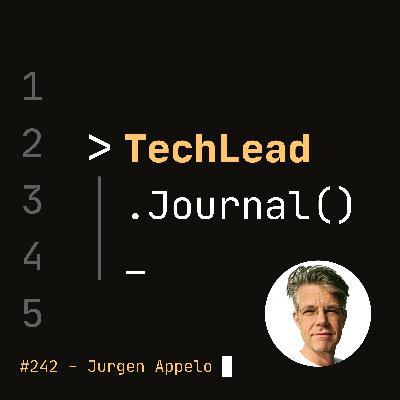
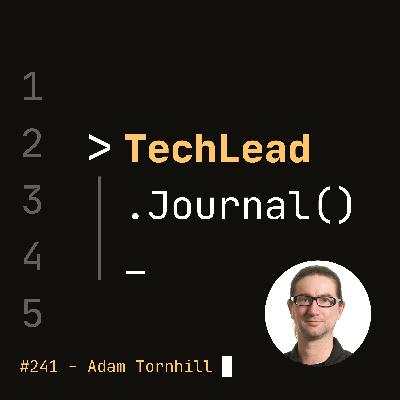
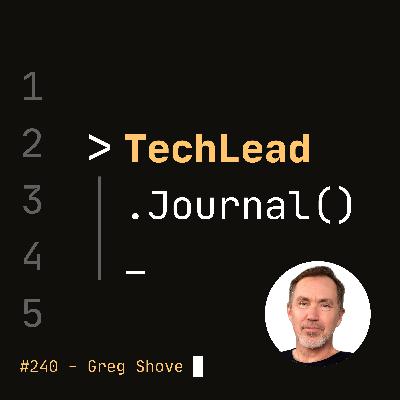
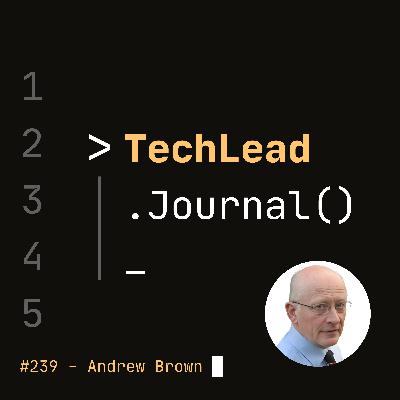
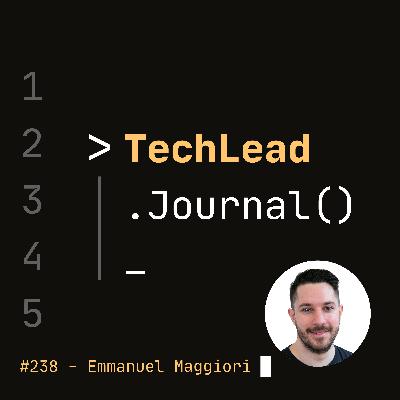
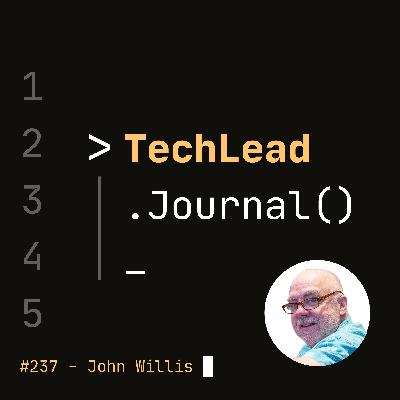
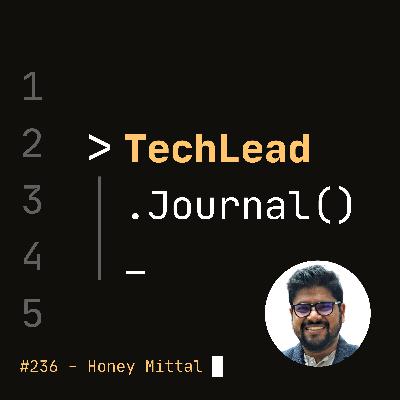
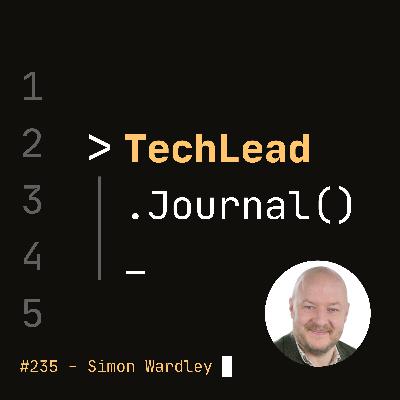
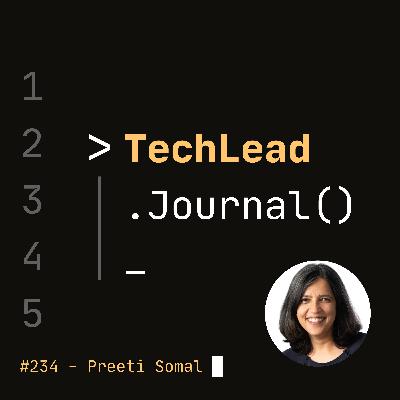
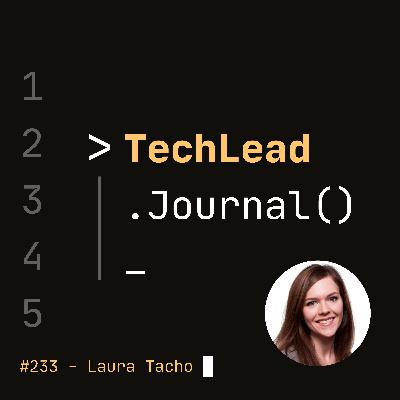
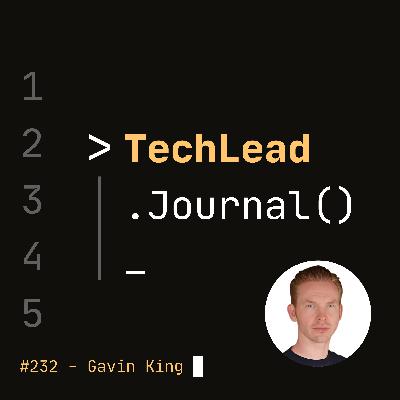
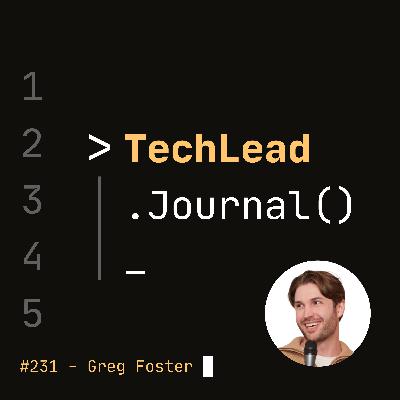
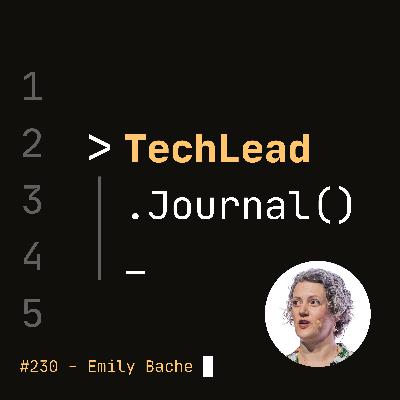
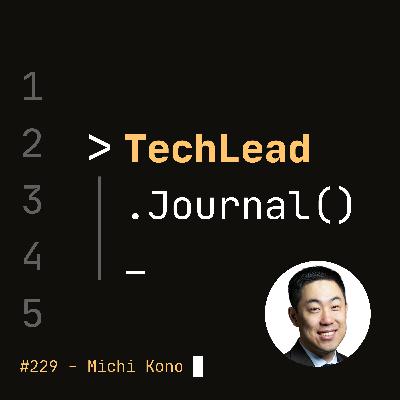



It's a very good session
I don't understand the guess
3:05
Didn't like the audio quality.. 😒
That's true, it's actually important to optimize business processes, and that's the reason I was pretty thorough while looking for good specialists to help me with that. I managed to discover https://processmix.com/ not so long ago, and I have to say that working with these professionals was one of the best decisions for my project.
Um dos melhores podcasts pra explicar DDD..